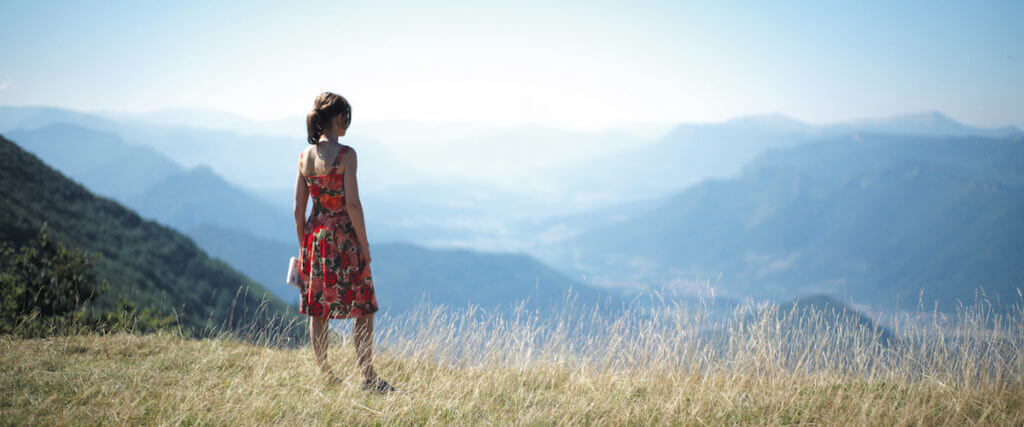<p><em>Things to Come</em> is a French-German philosophical drama film, written and directed by Mia Hansen-Love, about a brilliant educator coping with a midlife crisis. The central character, Nathalie (Isabelle Huppert), is a philosophy professor who has traded in the radicalism of her youth for a more thoughtful, passive, even “bourgeois” way of being. She is married to another philosophy professor, Heinz (Andre Marcon), who is more traditional in his ideals (as well as his teaching methodology), and often teases her about her past as a “Communist.” Despite having two grown children and a full-time job, Nathalie must spend much of her time caring for her hypochondriac mother, Yvette, played very convincingly by Édith Scob (<em>Eyes Without a Face</em>), who suffers from frequent and severe panic attacks. She calls Nathalie incessantly, pleading for her daughter to come take care of her at all times of the day and night. However, after striking up a platonic, intellectual relationship with one of her former students, Fabien (Roman Kolinka), tragedy strikes on multiple fronts, and Nathalie must cope with the new circumstances, which force her to reflect on her life and the philosophical concepts that have defined her life for decades.</p>
<p><em>Things to Come</em> is a film primarily about philosophy, and about living a contemplative life even in the face of extreme hardship and adversity. It presents characters that exalt the study of philosophy as perhaps the highest of all virtues, and then attempt to live out the theories they espouse with varying degrees of success. Nathalie is the former radical who simply wants to teach her students to think for themselves, while Andre is the traditional, conservative philosopher whose values are only vaguely alluded to in the film. Fabien is more of a young radical, who decides to live on a commune out in the country, to continue his philosophical writing while eschewing the pleasures of the bourgeois city life. Nathalie is somewhat obsessed with Fabien, who impresses her as a writer and thinker, and also reminds her of the youthful optimism that she once embraced, but has now cast aside.</p>
<p>One of the most difficult aspects of filmmaking has to be choosing how much information to give to the audience. Many films give us far too much information, and require no thought on our part (non-contemplative films), while others give us too little information, and leave us scratching our heads, trying to piece together a cryptic or even incomplete narrative. <em>Things to Come</em> strikes a perfect balance as a contemplative film, giving us only the information we need, no more and no less. Nathalie’s life is laid out for before us, with all of the missteps and lost opportunities, and we even have some access to her way of thinking, and the values that she projects out into the world.</p>
<figure id="attachment_835" aria-describedby="caption-attachment-835" style="width: 714px" class="wp-caption aligncenter"><img class="wp-image-835" src="https://philosophyinfilm.com/wp-content/uploads/2017/05/things-to-come-2016-007-roman-kolinka-isabelle-huppert-in-garden-at-twilight-ORIGINAL-300x200.jpg" alt="Roman Kolinka and Isabelle Huppert in Things to Come 2016" width="714" height="476" /><figcaption id="caption-attachment-835" class="wp-caption-text">Nathalie converses with her younger, more idealistic student, Fabien, played by Roman Kolinka (Things to Come, 2016).</figcaption></figure>
<p>We are made to observe Nathalie’s life, untainted by any judgment, and the many trials and obstacles that she faces over the years. She faces them bravely, clinging to her philosophical knowledge and ideals for support, even while her life ostensibly crumbles around her. Nothing ever presupposes that we should feel anything but an empathetic connection with Isabelle Huppert’s character, thus allowing us to fully engage with her and contemplate her existential crisis from a closer vantage point. She views thought and reality as one and the same, and thus cannot separate her theories from the life that she lives, or the one that she aspires to live. Fabien criticizes her for abandoning the revolutionary passion of her youth, but she sees this as a natural part of growing old. She sees radicalism as a way of being for the young, whereas the old are destined to fall back into more traditional modes of interpretation and thought.</p>
<p>In addition to a compelling and thought-provoking script, the cinematography in <em>Things to Come</em> is breathtaking. Much of the film is shot on location in France, with the characters moving through beautiful, natural locales, from the cobblestone streets of Paris, to the high cliffs of Grand Bé. The filmmakers frequently pan out to take in the landscape, urging us to engage in contemplative thought, just as Nathalie contemplates her existence and direction in life.</p>
<p>The ability to engage the audience in contemplation with Nathalie is perhaps the most effective and intriguing quality of <em>Things to Come</em>. Many filmmakers have tried to make films in which philosophy is openly discussed, but it often comes across as stale, or mere self-indulgence on the part of the scriptwriter. But in <em>Things to Come</em>, the philosophical discussions never overpower us, and never try to beat us over the head with moral platitudes or high-minded idealism. It is minimalism at its finest. We simply observe people as they live, observe, and think, and it encourages us to do the same.</p>
<p>Rating: ★★★★★</p>
<p>If you&#8217;d like to watch <em>Things to Come</em>, it is available to rent or purchase via Amazon <a href="https://www.amazon.com/gp/product/B071H8475T/ref=as_li_qf_sp_asin_il_tl?ie=UTF8&;tag=mjones34880c-20&;camp=1789&;creative=9325&;linkCode=as2&;creativeASIN=B071H8475T&;linkId=ca636199b8379e64df10de04c652bb55">here</a>.</p>

Review: Things to Come (L’Avenir, 2016) ★★★★★

